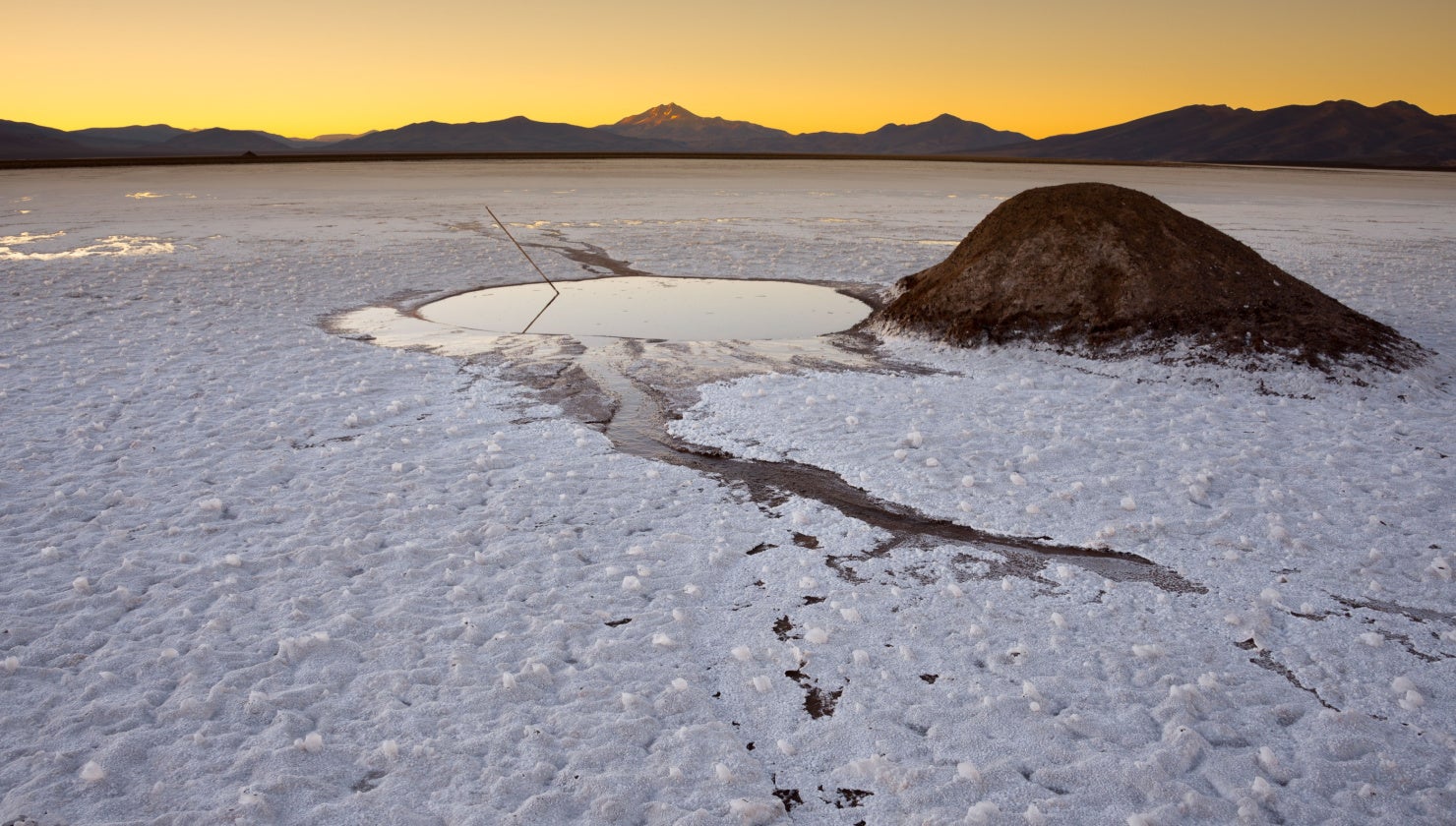Head of the environmental unit of Chile’s Atacama Indigenous Council, Francis Mandoca, states that lithium mines ruin one zone to satisfy another.
GlobalData Thematic Intelligence October 30, 2023
- Copy Link (Kopírovat odkaz)
- Sdílet na X
- Podíl na LinkedIn
- Sdílet na Facebooku

The global advocacy for clean energy, exemplified by the rising demand for lithium, has created unsettling realities in South America. The transition to lithium-ion batteries signifies a step towards sustainability, yet it does not come without cost. While we applaud the strides toward a greener future, it is important to acknowledge the challenges involved with the production of these clean energy solutions.
Ecological devastation is a bleak reality
The environmental fallout from lithium mining is clear and far-reaching. Massive quantities of fresh water, classified as a precious resource in these arid regions, are diverted for lithium mining operations, fueling the salt flats brine. This leaves local communities and wildlife parched. Sulfuric acid and sodium hydroxide used in lithium extraction penetrate the soil and water, poisoning ecosystems and endangering species. Research from the journal Sborník královské společnosti shows that two flamingo species in Chile are threatened because of lithium mining.
Jděte hlouběji s GlobalData

Social Responsibility Trends in Mining — Thematic Intelligence

Environmental Trends in Mining — Thematic Intelligence
Zlatý standard business intelligence.
Deforestation, habitat destruction and water pollution further exacerbate the ecological toll. The delicate balance of nature is disrupted, which leaves long-lasting damage that takes generations to heal. The carbon dioxide and other greenhouse emissions that come with the process of lithium mining, extraction and overall production are worse for the climate than the production of fossil fuel-powered vehicles. A study from The Wall Street Journal in 2019 revealed that 40% of the total climate impact caused by the production of lithium-ion batteries comes from the mining process itself.
Indigenous communities are under threat
The indigenous people of South America are negatively impacted by lithium mining, and the practice has driven hundreds off the land that they once called home. Mining giants in the region originally pledged to consult indigenous communities over lithium mining on their land to make sure it was environmentally sound. However, these corporations have refused to give indigenes a voice in how they are operated. Community leaders have rightfully demanded profits be channelled their way.
The indigenous community in the Chilean Atacama desert has two mining companies situated there. The head of the environmental unit of the Atacama Indigenous Council, Francis Mandoca, has said that the lithium mines are branded “sustainable” energy but they are not, as they ruin one zone to satisfy another. The community feels frustrated and concerned because the ponds they used to use have been contaminated with harmful chemicals and are now unusable.
Social struggles and human rights issues
The surge in lithium demand fuels social conflicts, echoing the grim historical pattern of Zelený imperialismus as detailed by Richard Grove, in which indigenous peoples are displaced from their ancestral lands and communities in the name of resource extraction, which according to GlobalData’s 2023 report has caused protests in Chile and Bolivia. The power dynamics are clear: mining companies, driven by economic interests, wield significant power and influence, while indigenous communities lack the resources and legal support to protect their rights. This perpetuates the exploitation and marginalisation of these communities.
Získejte přístup k nejkomplexnějším profilům společností na trhu, které využívají GlobalData. Ušetřete hodiny výzkumu. Získejte konkurenční výhodu.

Profil společnosti – vzorek zdarma
Váš e-mail ke stažení brzy dorazí
Jsme přesvědčeni o jedinečné kvalitě našich firemních profilů. Chceme však, abyste učinili to nejpřínosnější rozhodnutí pro vaši firmu, a proto nabízíme bezplatný vzorek, který si můžete stáhnout odesláním níže uvedeného formuláře

zprávy
Circular Economy – Thematic Intelligence
Sustaining ecological preservation
Indigenous peoples play a pivotal role in ecological preservation due to their deep-rooted connection with the land and the wealth of generational knowledge they possess. Across centuries, they have cultivated a profound understanding of ecosystems, plants and wildlife, passing down valuable wisdom through generations. This traditional knowledge serves as a repository of sustainable practices, helping to preserve biodiversity and maintain delicate ecological balances. Their holistic approach incorporates spiritual beliefs, ethics and rituals, ensuring the preservation of natural habitats.
In Chile, the displacement of indigenous peoples disrupted these holistic practices, leading to a drastic decline in nearby pond fish, endangering the flamingo species in Salars De Atacama.
In light of all these challenges, balancing the global demand for lithium with the preservation of South America’s environment and the well-being of its indigenous communities is not only a moral imperative but a necessity for a harmonious and sustainable future. It is a stark reminder of the urgent need for sustainable practices and the protection of both nature and human rights.
- Copy Link (Kopírovat odkaz)
- Sdílet na X
- Podíl na LinkedIn
- Sdílet na Facebooku
















